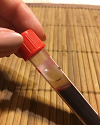



Grail has hit a major milestone as the liquid biopsy company is reporting it has been granted Break Through Device Designation by FDA. The Menlo Park, CA-based company is developing an investigational next-generation sequencing (NGS) blood test for the early detection of multiple cancer types in individuals 50 or older.
In addition, Grail will share new data from the Circulating Cell-free Genome Atlas (CCGA) study, at the 2019 American Society of Clinical Oncology Annual Meeting. The CCGA study is a prospective, observational, longitudinal study that has completed enrollment of about 15,000 people with and without cancer across 142 sites in the U.S. and Canada.
Grail said it is conducting three pre-planned sub-studies within CCGA to discover, train, and validate its multi-cancer early detection test. Previously, Grail reported data from the first pre-planned sub-study of the CCGA study, which showed that its three-prototype next-generation sequencing NGS blood tests were able to detect multiple deadly cancer types from a single blood draw, with a low rate of false positive results.
Since then, the company has since selected methylation as its preferred approach and has developed a methylation sequencing blood test that preferentially targets the most informative regions of the genome to both detect the presence of multiple types of cancer and identify the tissue of origin. The blood test is currently being evaluated in the second pre-planned sub-study of CCGA.
In a release, Jennifer Cook, who was tapped to be Grail¡¯s CEO in 2017 said, ¡°We¡¯re excited FDA recognizes the potential of our multi-cancer early detection blood test. There are no effective early detection tests for the majority of cancer types, and many deadly cancers are often detected too late. We hope our test may offer a chance to address these challenges. We have made significant progress developing our multi-cancer test and look forward to sharing new data at ASCO and other medical conferences this year.¡±
Liquid Biopsy Momentum Continues to Flow
From its record-breaking financings to 50,000-patient clinical trials, Grail has always been a larger-than-life diagnostics company. Ever since it was announced that Illumina would spinout Grail as a separate company, the liquid biopsy specialist has been running at full speed. Today¡¯s announcement falls in line with the pace Grail has set.
But it¡¯s hardly the only company in the liquid biopsy space that has been overflowing with activity. Grail¡¯s largest rival, Guardant Health transitioned from a private to public company, raising about $238 million in an IPO. Redwood City, CA-based Guardant Health got involved in a little M&A action in late March, picking up Bellwether Bio, a private company focused on improving oncology patient care through pioneering research into the epigenomic content of cell free DNA. The deal was for an undisclosed sum.
Roche perhaps had one the largest liquid biopsy M&A¡¯s in recent history, when it acquired Foundation Medicine for $2.4 billion. The relationship between the two companies dates back to January 2015 when Roche invested roughly $1.03 billion to acquire a majority interest in Foundation Medicine.